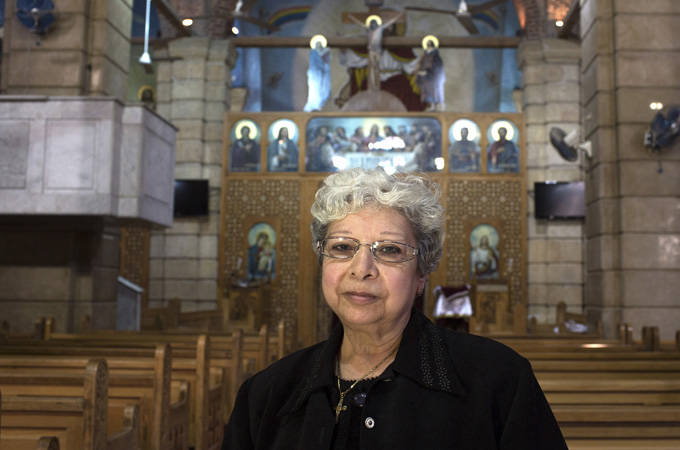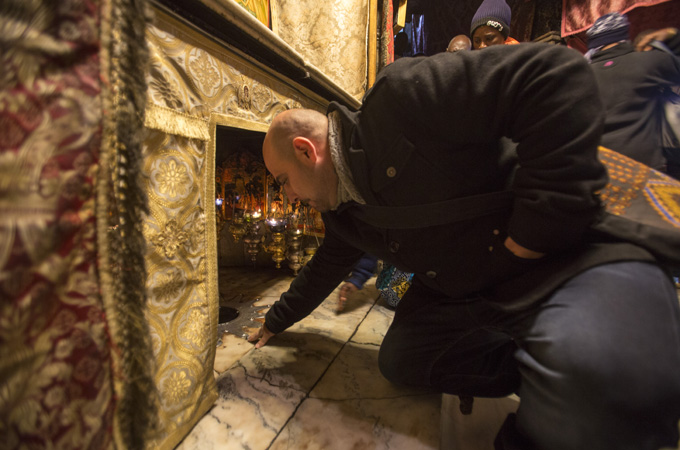
Being Christian
Christians from Middle Eastern countries share their stories on freedom of worship and access to the Holy Land.
| ‘Life is not easy here’ |
 |
| Hania Kassicieh Persekian is a Palestinian Christian living in Jerusalem and says sometimes she has to hide her identity [Ilan Mizrahi] |
Name: Hania Kassicieh Persekian
Age: 51
Occupation: Programme co-ordinator at the Swedish Christian Study Center
Lives in: Jerusalem
“We love this country. We don’t like to be away, as a family, we have been here longer than most people,” Hania Kassicieh Persekian says.
“I was born in Jerusalem’s Old City in the days when the Jordanians controlled it and [have seen] a lot in my lifetime. We have a family house in the Old City, but many of the family members left the country since life is not easy here, especially as Palestinians in a Jewish state. We suffer from endless bureaucracy by the Israeli authorities …. We don’t get building permissions and that really make things harder for us …
“We have the freedom to worship but sometimes we prefer to hide our religion or ethnic background, in particular in the Jewish areas, where we don’t feel very comfortable and people [look] at us when we speak in Arabic. During the high seasons and holidays, the police block the area … making our lives very difficult. I don’t think it is necessary, since in the old days when others controlled the region, more pilgrims came to Jerusalem than today, and no roadblocks were needed. I think it is part of the Israeli authorities’ obsession to control the minorities that are living under the Israeli occupation.
“We have no problem [in travelling within] Israel or [in entering] the Palestinian cities like Ramallah or Bethlehem, but we can’t travel to most of the neighbouring Middle Eastern countries that are in conflict with Israel since we have an Israeli ID. Our relatives in the West Bank or in Jordan [face] the same problems as we [do], but from the other side of the borders.
“It is not easy for them to visit us in Jerusalem at the Christian holidays since the Israeli authorities [do] not allow them all to enter the country, and that creates a problem for our families who are trying to preserve our traditions and customs. Unfortunately, the Israelis [see] us only as Arabs, regardless [of] our religion and that is the main problem we have. We wish to be equal in this country and hope for the occupation to end.
“The Israelis are in charge [of] the crossing points between the West Bank and Israel, so we as Christians don’t have as many problems as the Muslims would have crossing the checkpoints. This creates tension between the Christians and the Muslims and maybe it’s what the Israelis want.”
| ‘Taking cover in Christ’ |
 |
| Georgette Essa says Coptic Christians have been persecuted in Egypt since the fall of President Hosni Mubarak [Scott Nelson] |
Name: Georgette Essa
Age: 65
Occupation: Widowed housewife and grandmother
Lives in: Shubra district of Cairo, Egypt
Georgette Essa grew up in the Shubra district of the Egyptian capital as an only child, with her mother and father raising her with the values of the Coptic Church. She has an adult son who owns a local company, and also had a daughter who was a doctor, but died a few years ago.
Essa says that while growing up in Shubra – a working class, predominately Christian neighborhood on the north side of Cairo – she recalls there being few tensions between Christians and Muslims there. She once lived in a building that had mostly Muslim tenants, and everyone treated her well.
“The relationship between me, a Christian, and the Muslim tenants was normal, like we were relatives. But there has been a shift in Egypt the past few years. I now consider Muslims as belonging to two distinct groups, one friendly to Christians, the other not,” she says.
“The first group, there is no difference between [Christians and Muslims] .…We are friends, and we get along quite well .….Then there is a radical group, where you have extremists, the Salafis and the Muslim Brotherhood .…They are the ones who are committing the terrorist acts in Egypt.
“I blame the Muslim Brotherhood dominated government of Mohamed Morsi for the increased persecution of Christians in Egypt. We lived 30 years under [Hosni] Mubarak, and every now and then an incident would take place. But in all those years, we didn’t see the amount of persecution that we saw under just one year of Morsi.
“The most persecution that Egyptian Christians have faced has been this past year. About a hundred churches were burned, and a thousand [Christian owned] pharmacies and businesses were burned …
“The more persecution that takes place, the more the churches get crowded. It’s as if we’re hiding, or taking cover in Christ. He’s the one who protects us.
“Apart from the persecution, there is nothing stopping me from practising my religion, or making a trip to the Holy Land. I have made the trip twice, in 2004 and 2006.
Since the 1979 Egypt-Israel peace treaty, the Coptic church officially discourages the trip (in solidarity with Palestinians and for domestic political reasons), it can still be made rather easily through a number of Christian travel companies. It is, however, still fairly uncommon for Egyptian Christians to make the trip due to costs involved as well as the church’s discouragement.
“Not too many people here go to the Holy Land, I’m not sure of the exact number. The Church has banned anyone from going there until Jerusalem is liberated .… But I just really wanted to visit Jerusalem, and the holy places where my beloved Jesus visited. And I wanted to see his light, the Saturday of Light. To see this light, it’s truly very beautiful.”
| ‘I’ve never been discriminated against for being a Christian’ |
 |
| Bashir Qonqar says many Christian Palestinians living in the West Bank face harrassment [Ahed Izihiman] |
Name: Bashir Qonqar
Age: 33
Occupation: Artist
Lives in: Bait Jala, Bethlehem
“My father was killed by the Israeli soldiers in the first intifada in 1988, since then my family and I had tough times surviving due to the bad economic situation.
“My brothers and I started working at a very early age in order to provide the daily bread, although our life wasn’t easy, all of us were able to get a good university degree and therefore all of us have good jobs now. In 2000, after the second intifada, I had the opportunity to study in Germany. I came back to Palestine in 2008, and have since been working in public relations for the Caritas Baby Hospital in Bethlehem, whilst also teaching at Dar al-Kalima University College of Arts.
“I love living in Bethlehem. I enjoy the social life, but can’t forget that I am living under Israeli occupation. I am also really lucky that I have a job in a place were 35 percent of the Palestinian youth are unemployed. Being an artist doesn’t provide enough means of living, that’s why I have another job.
“Some of [the] Christians are leaving the country because of religious harassment that we receive from the Israeli side. We face very clear discrimination, and they also try to discriminate between us and Muslims. But personally I have never been discriminated against or harassed for being a Christian in Palestine.
“But I have never had access to enter Jerusalem, which is fully under Israeli occupation. That is why I have only been able to pray and visit Christian holy sites within the West Bank. I don’t even know where my sister’s house is in Jerusalem, she married a Palestinian Christian from the Old City – she [lives] only 15km away from Beit Jala.”
| ‘I was told it’s Israel not Palestine’ |
 |
| Tawfeeq Mansur was refused a vise to return to Palestine and has not been back since 1967 [Ala’ al-Sukhni] |
Name: Tawfeeq Mansur
Age: 60
Occupation: Merchant
Lives in: Jordan
“Christians in Jordan are respected by all Jordanians. They live a happy and decent life and are able to fully practise their worshiping rituals with the help of the state,” says Mansur.
“During our holidays, the government visits the church offering their best wishes. So we enjoy complete freedom here. There are no problems and neither myself nor any of my relatives have ever been subject to harassment. Muslims and Christians here are brothers [who] cannot be divided.
“I lived in Ramallah for three years, but after 1967 I never went back because I couldn’t get a visa. When I applied for the visa I told the official there that I wanted to go to Palestine. That’s when he screamed and said it’s Israel not Palestine and they refused to grant me a visit visa.”
| ‘Jerusalem is already in my home’ |
 |
| Joseph Abdel Sater is confident he will one day be able to go for the pilgrimage in Jerusalem [Habib Battah] |
Name: Joseph Abdel Sater
Age: 51
Occupation: Runs a cell phone shop
Lives in: The predominantly Christian neighborhood of Ain El Remmaneh in Beirut, Lebanon
Joseph Abdel Sater’s shop is just across the street from the site of the infamous 1975 bus massacre that helped spark the Lebanese civil war. But he barely remembers the clashes he witnessed that day between Palestinians and Christian militiamen, and says the country has moved on from the ensuing 15 years of political and sectarian violence.
“Every religious group in Lebanon has freedom to practise as they wish, despite efforts to scare people back into war.
“I am 100 percent confident that peace will prevail in the region and that I will one day be able to make a religious pilgrimage to Jerusalem. But Lebanese law currently bans travel to Israel, with the two countries technically at a state of war.
“It is okay to delay [the pilgrimage] for the sake of the country’s stability. If you go there, they will call you a terrorist or a traitor.
“You don’t have to be physically in Jerusalem. If you are a Christian, Jerusalem is already in your home.”
Reflecting briefly on the events of 1975, he adds: “We are against war, but if someone comes to [attack] your house, you have to defend it.”
For more on the obstacles facing Christian pilgrims in the Middle East, watch Forbidden Pilgrimage
Al Jazeera World can be seen each week at the following times GMT: Tuesday: 2000; Wednesday: 1200; Thursday: 0100; Friday: 0600; Saturday: 2000; Sunday: 1200; Monday: 0100; Tuesday: 0600. Click here for more Al Jazeera World. |
